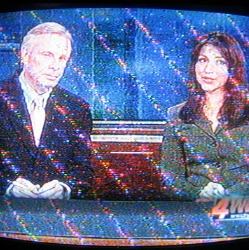BOB GARFIELD: Andrew Tyndall runs The Tyndall Report. He’s been monitoring the Nightly Network News for some 20 years. We called him to follow up on the conversation we had two weeks ago with The Atlantic's James Fallows, who had detected in newspaper editorial pages a tendency toward false equivalency, in this case, assigning culpability for the crisis to Washington dysfunction, as opposed to a renegade Tea Party minority. Tyndall says network TV, by its nature, fell into the same pattern.
ANDREW TYNDALL: Television news is very interested in anecdotalizing and personalizing any abstract story. One of my favorites was NBC’s Harry Smith giving us the mating sound of the elks in Yellowstone National Parks, and the tourists who would not be around to listen to this annual ritual of the fall.
[NBC NEWS CLIP]:
[ELK MATING SOUNDS/UP & UNDER]
HARRY SMITH: A visit to Yellowstone affirms our belief in America as a special place, but if the government shuts down, so will the park.
[ELK BUGELING SOUNDS]
And that’s a shame.
[END CLIP]
ANDREW TYNDALL: The implicit message of all of these anecdotes is dysfunctional Washington has harmed real people, not the true story, which is this is a crisis that’s going on inside the Republican caucus of the House of Representatives.
BOB GARFIELD: Andrew, you suggest that this leaves the blame at the feet of institutional Washington, as opposed to the feet of the Tea Party caucus. I see it more of a Rorschach test. I believe it's the fault of the Tea Party, and perhaps others interpret it based on their political world view that says, oh no, it’s the Democrats who obsessively cling to the flawed policy of Obamacare. Is this false equivalency or is it just a Rorschach test?
ANDREW TYNDALL: It’s a problem of lack of specificity. Yes, generally speaking, it is a problem of dysfunctional Washington. The more specifically you get in describing who the people are who are failing to come through a compromise, as revealed over the last two weeks, the actual conflict was going on inside Speaker Boehner’s caucus. That’s not a question of a Rorschach test, that’s a question of being precise.
BOB GARFIELD: The story, Harry Smith’s assignment, was to put some flesh and blood on what seems like the usual intractable inside-the-Beltway conflict. And he does that. Is every reporter responsible in every story for the political context for what triggered the story, to begin with?
ANDREW TYNDALL: No. It’s the responsibility of the editors and the producers to put together a series of packages which look at the problem from all sides, give vivid real world examples, including cute nature scenes, but also give precise sound bites from actual politicians actually involved in the activity.
However, the other side of the coin on television news, when it is covering actual inside-the-Beltway politics, is also to personalize this story, to cover the White House, rather than to cover Congress, a single recognizable person, rather than a gaggle of people, most of whom are, are nameless and faceless, as far as the viewer is concerned.
BOB GARFIELD: Do you think TV viewers, in general, had they depended only on cable news channels and the networks, would have come away, inevitably, with the notion that parties are equally responsible?
ANDREW TYNDALL: Careful TV viewers would have found enough coverage which offered the specificity that I'm talking about. However, the default position - network television news, not the more ideological cable channels - is to try and find the center ground, if at all possible, and also to try and get out of the political weeds and into the lives of real people, if at all possible. Both of these tendencies fought against the specific sort of coverage, which would have given an accurate picture.
BOB GARFIELD: Andrew, thanks so much.
ANDREW TYNDALL: No problem.
BOB GARFIELD: Andrew Tyndall runs the website, The Tyndall Report.

